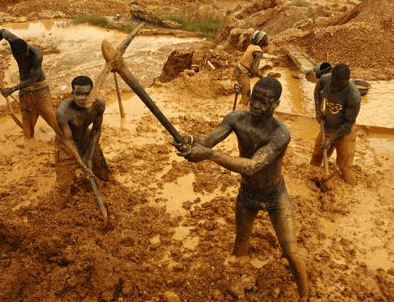CHRAJ urges sustained public engagement to stop illegal mining
 The Commission on Human Rights and Administrative Justice (CHRAJ) has underlined the need for sustained public education and engagement to stop illegal mining.
The Commission on Human Rights and Administrative Justice (CHRAJ) has underlined the need for sustained public education and engagement to stop illegal mining.
“There should also be alternative livelihood interventions for those who gave up on the illegal activity that had been causing so much destruction to the environment”, Mr. Richard Amoako Ansong, a Principal Investigator at the Public Relations Unit of the Commission, said this when he spoke to the Ghana News Agency (GNA) in Accra.
This comes as the government gives the strongest indication yet that the ban on small scale mining could soon be lifted. He said the government had a reason for placing a ban on the activity and it was important to make sure that the intended outcomes were achieved.
The massive destruction of water bodies, food crop farms, farmlands and forests by illegal miners should not be allowed to continue. Mr. Ansong said until the necessary mechanisms were put in place, it would be difficult for many to back any decision to lift of the ban.
Touching on the punishment meted out to arrested illegal miners, he said if the general consensus was that it was not punitive enough “we should initiate the necessary process to get the law amended”.
President Nana Addo Dankwa Akufo-Addo recently served notice of government’s intention to lift the ban on small scale mining within the framework of a comprehensive roadmap to restore sanity to the sector.
Opening a two-day sensitisation workshop on the elimination of illegal mining in Ghana for traditional and religious leaders he said the temporary ban on galamsey was supposed to be a measure to streamline the small-scale mining sector.
The government, he added, would soon make a clear statement setting out a comprehensive roadmap to include the lifting of the ban to permanently deal with the galamsey menace.
The roadmap would address among other issues, the reforestation and reclamation of destroyed lands, restoration of water bodies, strict supervision of the processes of awarding mining licenses and associated permits and the establishment of a mercury pollution abatement project.
It would also involve the implementation of alternative livelihood project for the illegal miners and systematic control on the engagement of excavators in mining areas.
“When the ban is lifted you will have the responsibility to preserve our lands, water bodies and environment. We all have a duty to say no to galamsey for our own common survival and the survival of those who are to come after us,” President Akufo-Addo told the traditional rulers.
The government imposed an initial six-month ban on small-scale mining activities in 2017 and the ban has since then been in force.
Source: GNA
